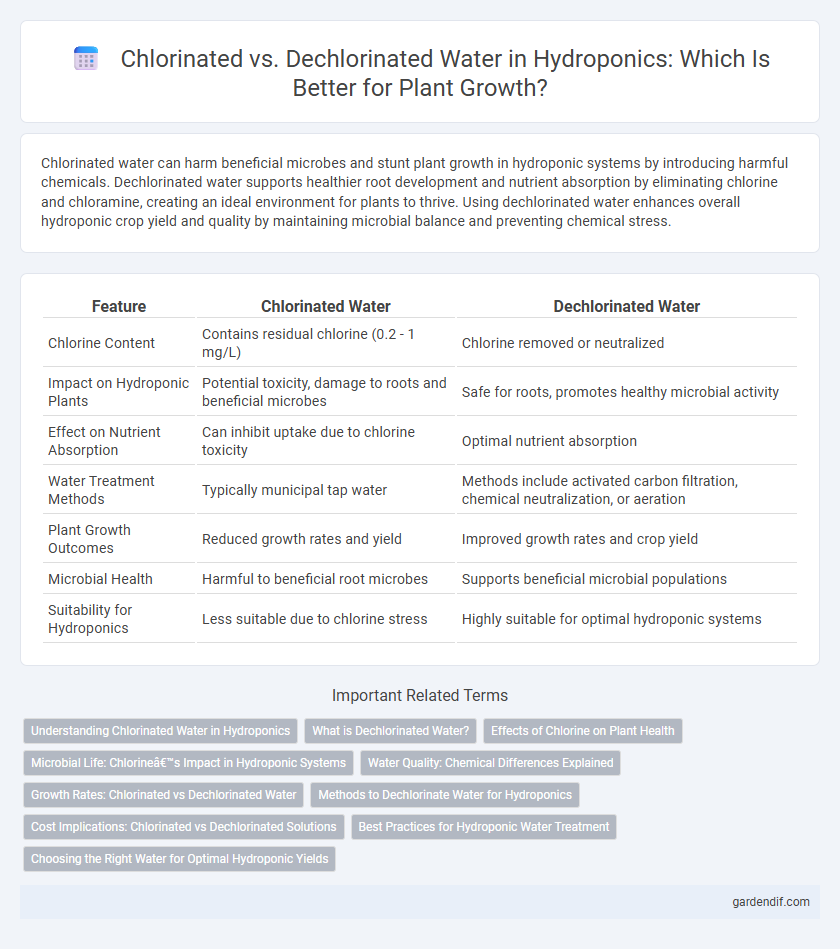
Chlorinated Water vs Dechlorinated Water Illustration
Chlorinated water can harm beneficial microbes and stunt plant growth in hydroponic systems by introducing harmful chemicals. Dechlorinated water supports healthier root development and nutrient absorption by eliminating chlorine and chloramine, creating an ideal environment for plants to thrive. Using dechlorinated water enhances overall hydroponic crop yield and quality by maintaining microbial balance and preventing chemical stress.
Table of Comparison
| Feature | Chlorinated Water | Dechlorinated Water |
|---|---|---|
| Chlorine Content | Contains residual chlorine (0.2 - 1 mg/L) | Chlorine removed or neutralized |
| Impact on Hydroponic Plants | Potential toxicity, damage to roots and beneficial microbes | Safe for roots, promotes healthy microbial activity |
| Effect on Nutrient Absorption | Can inhibit uptake due to chlorine toxicity | Optimal nutrient absorption |
| Water Treatment Methods | Typically municipal tap water | Methods include activated carbon filtration, chemical neutralization, or aeration |
| Plant Growth Outcomes | Reduced growth rates and yield | Improved growth rates and crop yield |
| Microbial Health | Harmful to beneficial root microbes | Supports beneficial microbial populations |
| Suitability for Hydroponics | Less suitable due to chlorine stress | Highly suitable for optimal hydroponic systems |
Understanding Chlorinated Water in Hydroponics
Chlorinated water contains chlorine compounds used to disinfect and prevent microbial growth, but in hydroponics, it can harm beneficial root microbes and nutrient uptake. Understanding the impact of chlorine helps maintain a balanced root zone by avoiding toxicity and ensuring optimal plant health. Dechlorination methods like activated carbon filters or aeration effectively remove chlorine, preserving water quality and promoting robust hydroponic growth.
What is Dechlorinated Water?
Dechlorinated water is water that has undergone a treatment process to remove chlorine and chloramine, which are commonly used disinfectants in municipal water supplies. This removal is essential in hydroponic systems because chlorine can damage beneficial microbes and sensitive plant roots, hindering growth and nutrient absorption. Methods such as activated carbon filtration, chemical neutralizers, or aeration are used to ensure water is safe and optimal for hydroponic cultivation.
Effects of Chlorine on Plant Health
Chlorinated water contains residual chlorine that can disrupt the delicate root microbiome essential for nutrient absorption in hydroponic systems, leading to stunted growth and reduced yield. Dechlorinated water, achieved through methods like activated carbon filtration or chemical neutralization, helps maintain beneficial microbial populations and prevents oxidative damage to root tissues. Ensuring optimal water quality by minimizing chlorine levels preserves plant health and enhances overall hydroponic crop productivity.
Microbial Life: Chlorine’s Impact in Hydroponic Systems
Chlorinated water in hydroponic systems negatively affects microbial life by killing beneficial bacteria and fungi essential for nutrient cycling and disease suppression. Dechlorinated water preserves these microbial communities, promoting a balanced and healthy root environment that enhances plant growth and resilience. Maintaining optimal microbial populations through dechlorinated water improves nutrient availability and reduces the risk of root pathogens in hydroponic setups.
Water Quality: Chemical Differences Explained
Chlorinated water contains chemical compounds like chlorine and chloramine used for disinfection, which can be harmful to hydroponic plants by disrupting root development and microbial balance. Dechlorinated water, treated through methods such as activated carbon filtration or chemical neutralization, removes these oxidizing agents, ensuring safer water quality that promotes healthy nutrient uptake and microbial activity. Maintaining optimal water quality with dechlorinated water reduces phytotoxicity and supports vigorous growth in hydroponic systems.
Growth Rates: Chlorinated vs Dechlorinated Water
Chlorinated water can inhibit nutrient uptake and microbial activity in hydroponic systems, resulting in slower plant growth rates compared to dechlorinated water. Dechlorinated water promotes healthier root development and optimal microbial balance, enhancing nutrient absorption and accelerating plant growth. Studies show up to a 20% increase in growth rates when using dechlorinated water instead of chlorinated water in hydroponic cultivation.
Methods to Dechlorinate Water for Hydroponics
Methods to dechlorinate water for hydroponics include using activated carbon filters, which effectively remove chlorine and chloramine compounds, ensuring plant safety and nutrient stability. Chemical dechlorinators, such as sodium thiosulfate, neutralize chlorine quickly but must be carefully dosed to avoid toxicity. Allowing water to sit for 24-48 hours promotes natural chlorine off-gassing, but this method is less effective against chloramine and requires monitoring to maintain optimal hydroponic system conditions.
Cost Implications: Chlorinated vs Dechlorinated Solutions
Chlorinated water in hydroponic systems often reduces costs due to its availability and effectiveness in controlling pathogens, minimizing the need for expensive chemical treatments. However, long-term use of chlorinated water can damage plant roots and beneficial microbes, potentially increasing crop losses and costs related to yield reductions. Dechlorinated water requires additional investment in filtration or neutralization processes but promotes healthier plant growth and microbial balance, ultimately enhancing productivity and reducing expenses on plant disease management.
Best Practices for Hydroponic Water Treatment
Chlorinated water can harm beneficial microbes and stunt plant growth in hydroponic systems, making dechlorinated water the preferred choice for nutrient solutions. Best practices include using activated carbon filters or letting water sit exposed to air for 24-48 hours to naturally dissipate chlorine and chloramine. Maintaining optimal water quality with frequent testing ensures a balanced pH and prevents toxic buildup, promoting healthier root development and higher crop yields.
Choosing the Right Water for Optimal Hydroponic Yields
Chlorinated water contains chemicals that can harm beneficial microbes and inhibit nutrient uptake in hydroponic systems, reducing plant growth and yields. Dechlorinated water, achieved through methods like aeration or activated charcoal filtration, promotes a healthier root environment and maximizes nutrient absorption essential for optimal crop production. Selecting dechlorinated water ensures stable pH levels and prevents chemical stress, directly enhancing hydroponic plant performance and overall yield quality.
Chlorinated Water vs Dechlorinated Water Infographic

 gardendif.com
gardendif.com